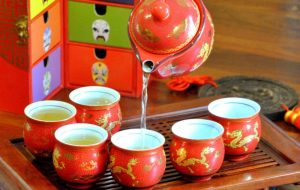Tea
This is one of a series of articles on food written by David Murray (see the full list on the right hand sidebar).
 No-one knows quite how it happened, as it happened centuries ago, but a belief took hold and was passed down from generation to generation. An idea, acceptable as fact to many, became engrained in our human history. A cultural marker, a prevalent practice, perhaps a relic of evolution turned indulgence.
No-one knows quite how it happened, as it happened centuries ago, but a belief took hold and was passed down from generation to generation. An idea, acceptable as fact to many, became engrained in our human history. A cultural marker, a prevalent practice, perhaps a relic of evolution turned indulgence.
We all believe, to some degree, that tea is good for you.
Now, modern times and modern practices often shed light on assumptions in history, and tea drinking is no exception. We don’t know how our ancestors measured the benefits of tea, but whatever their methods the idea stuck. And now, we seek to solidify that as fact.
Today you can easily get your hands on hundreds of varieties of tea, from the exotic Chinese imports to the supermarket brand teabags and the organic herbals sold at your local café. Unfortunately, with such variety, there is no set of parameters to measure all tea at once. So we must discuss it in two categories: ‘traditional’ teas and ‘herbal’ teas.
Traditional teas come from a specific single breed of plant, known as ‘Camellia Sinensis’. In this category we will find your black teas, your green teas, white teas and oolongs. The vast majority of research has been done to study these varieties, and the results seem to hold true to our ancestors’ beliefs.
Traditional teas boast a host of life-boosting properties that you may not even notice. Research suggests that regularly drinking tea helps to protect your body against an incredible range of cancers. It also lowers your risk of heart attacks and degenerative brain diseases like Alzheimer’s or Parkinson’s. It’s good for your cardiovascular system and improves your muscle endurance by encouraging your body to use fat for fuel. Oh, and it helps you burn fat. As if you didn’t have enough reasons to drink the stuff.
Like coffee, traditional teas also contain caffeine. But tea contains much fewer calories than coffee. As long as you don’t add milk or sugar, tea doesn’t need to be worked off. If anything, it can help you work off something else.
Now, the variety of herbal teas available to us means that their benefits and purposes are also many. Consider the ingredients and how they interact with your body. The results will differ from tea to tea, and herbal teas tend to be designed to help your body in specific areas. Just be sure you understand what they will do, and what they contain. And watch out for artificial sweeteners! Your herbal tea shouldn’t really need sugar.
Tea is wonderful. Tea is part of who we are as a species. It gives us an extra layer of protection, but it’s not a bullet-proof vest. Remember that everything we consume has an impact on our body, and including one healthy thing doesn’t undo an unhealthy diet. Make sure your entire diet is balanced and healthy!
